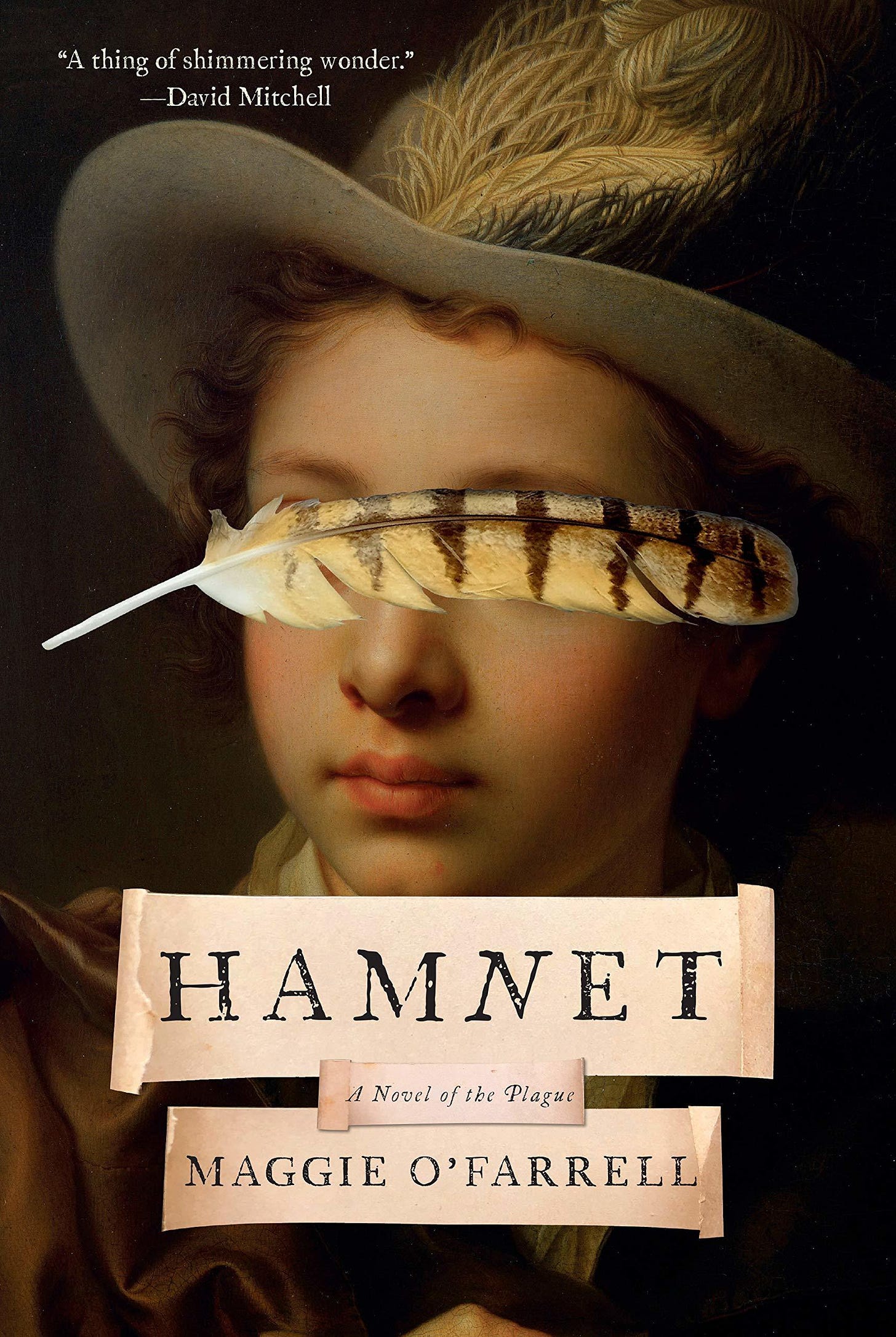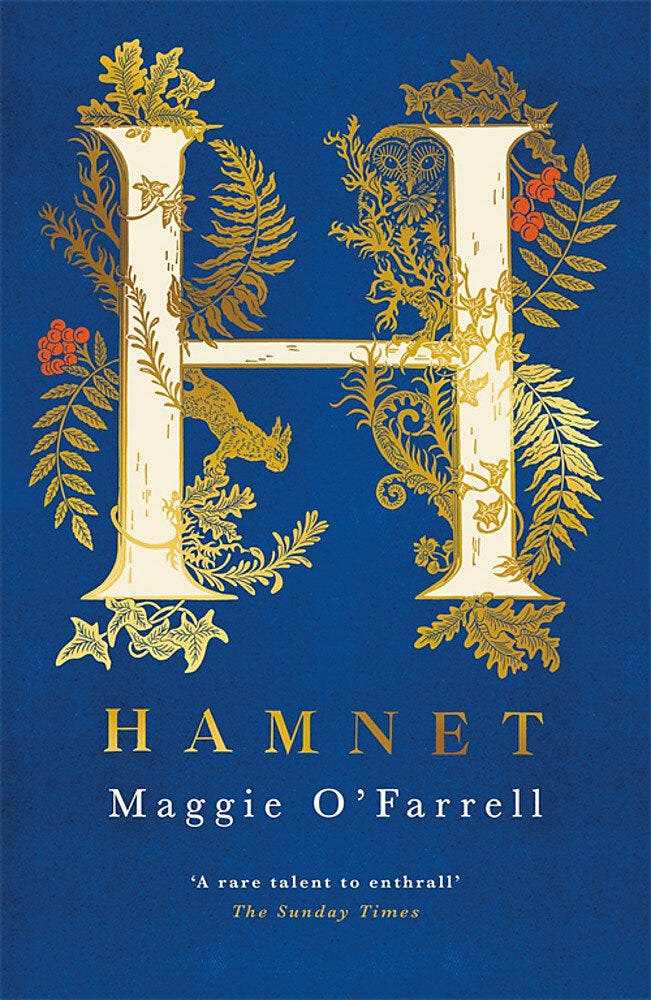Hamnet, Maggie O'Farrell
Fictional biography about Shakespeare's family
It’s not really possible to write a biography of Shakespeare
Modern writers get multiple biographies that try and manage the weight of information from letters and interviews and memories and public writings. Whole archives exist for them. About Shakespeare we only know the sort of things we would know about anyone else: what property he owned, the names of his children, the lawsuits he was involved in, his father’s job. There are no letters.
That means we don’t know his opinions. Take a writer like Milton: we know what he thought about free speech, kingship, divorce, religion, you name it. Shakespeare is so unknown to us there are passionate believers in both camps on whether he was Catholic or Anglican. Some funny people don’t even think he was Shakespeare, with something like half a dozen live conspiracy theories about his identity.
But there are bits of information we can infer about his life. The biggest and most interesting is that Hamlet was written as a response to his son’s death. The son was called Hamnet. Elizabethan orography was much less consistent that today and the two names were the same. Shakespeare himself spelt his own name differently on different documents. Harold Bloom always maintained that Hamlet was about Hamnet.
This was an under explored topic until Maggie O’Farrell wrote Hamnet, the most interesting novel I’ve read this year.
Precise, accurate, made up, and compelling
Because we know nothing about Shakespeare or his life, Maggie O’Farrell has to make it all up. Like Penelope Fitzgerald, O’Farrell fills in the gaps of history with concise details, taken from contemporary books of herbals, falconry and others, which make you wonder how she does it. All that talk of sheep and clothes and housework and transport and rivers, all becomes a seamless reality.
Shakespeare’s wife, usually known as Anne becomes Agnes, based on her father’s will which O’Farrell read for her research. She is a seer and a herbalist, a wonderful combination of two major topics running through Shakespeare: the mystic and the parochial. Their marriage is one of the best things in the book and there’s an excellent sex scene, which is well written, integral to the plot, and challenges the assumption that Agnes trapped Shakespeare into marriage. Watch out for the apples.
All of the details about children are precise and vivid, another Fitzgerald parallel. They are at the centre of the book, not just dying but working with their grandparents, staying at home with their mother, moving house, watching their parents, playing, taking responsibility in emergencies.
A novel that is a biography and a piece of literary criticism
Best of all, this is a response to Hamlet, interacting with its themes and ideas and structure and some of the crucial scenes. And it frees the play from all the usual morbid talk about moody Hamlet and the meaning of life. The stink of Elizabethan life practically comes of the page, and Shakespeare’s family have all the real, mixed, inconsistent emotions of the characters he wrote. O’Farrell has thought deeply about the whole set of lives that must have been lived for a play like Hamlet to get written.
It gives us a practical way of thinking about what Shakespeare must have gone through to be able to write Hamlet. Not just the death of his son, but the associated professional and personal problems that comes with. And how he would have experienced it against the context of his own parents, his own position within his family. O’Farrell shows him starting out as a young, nerdy Latin tutor, unhappy with his life trapped in Stratford and sends him on his journey to London and fame and fortune and then tragedy.
The ending is a real tear jerker and I won’t spoil it. But it starts to hint at a way of reading that play that gets away from thinking of it as just a tragedy. Like Harold Bloom said,
it isn't actually a tragedy. It's an apotheosis, a transfiguration, a kind of upward-breaking transcendence of the protagonist. It actually has more in common with the high comedies written just before and after it—As You Like It and Twelfth Night—than it does with Julius Caesar or Othello.
I didn’t like the first chapter but I’m glad I kept going
I wasn’t going to read this book. It has all the warning signals of something you should wait until you can get it in a charity shop so you can ditch it after twenty pages if you need to. That is to say it is written in ‘beautiful, lyrical prose’, won a prestigious prize, and is described all over it’s covers as dazzling, flawless, stunning, devastating, heartstopping, miraculous, profound, beautifully imagined.
But it is easily the best new novel I have read for a while. I’m so glad I got it now and can re-read it. I much preferred it to The Mirror and the Lamp, which I didn’t abandon soon enough. The characters of Shakespeare and Agnes pop in and out of my head all day.
Like Shakespeare, O’Farrell has the art of picking the right story and embellishing it freely and wildly.
If you want to know more about the research behind the book, there’s a wonderful Folger Library podcast with Maggie O’Farrell here.
For another great novel about a marriage, try Rafael Yglesias. Or hit the movies.
For more astonishing historical fiction, read Penelope Fitzgerald.
Thanks for reading. If you’re enjoying The Common Reader, let your interesting friends know what you think. Or leave a comment at the bottom.
If you don’t subscribe to The Common Reader, but you enjoy reading whatever’s interesting, whenever it was written, sign up now.



